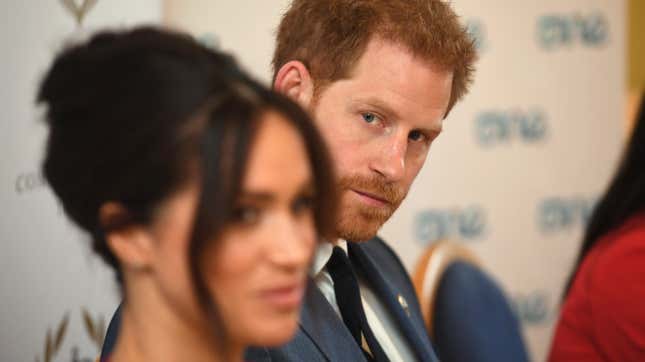
When one considers the scope of white privilege, it’s difficult to imagine any contemporary entity—or historical, for that matter—that encompasses it more broadly than the British monarchy. Throughout history, the family now known as the Windsors has symbolized not only the bastion of whiteness known as the British Empire but its colonization of Black and Brown civilizations throughout the world; a legacy that has remained inescapable even as it tentatively accepted Meghan Markle into the royal fold in 2018.
As history has already proven, while the British family may have been ready to embrace a new era and interracial royal relationship, the British public and press were frequently less warm to the idea of a half-Black, divorced American actress as a royal. Accordingly, as a new decade dawned in the early months of this year, so did the move across the Atlantic known as “Megxit,” marking yet another history-making moment in the monarchy. Now, Prince Harry, Markle’s husband of two years, says it was his relationship with Markle (and undoubtedly, the response to it) that opened his eyes to unconscious bias.
“[U]nconscious bias, from my understanding, having the upbringing and the education that I had, I had no idea what it was,” Harry admits during a discussion for British GQ with fitness trainer, author and activist Patrick Hutchinson for Black History Month in the UK. Hutchinson became dubbed the “accidental hero” in the United Kingdom after he rescued an injured white counter-protestor during a Black Lives Matter protest in June—a selfless act which in itself was an exercise in overcoming unconscious bias.
“I had no idea it existed,” Harry continues. “And then, sad as it is to say, it took me many, many years to realize it, especially then living a day or a week in my wife’s shoes.”
Longtime royal-watchers will no doubt remember a much younger Harry’s ill-conceived choice of Halloween costume in 2005, when he dressed in Nazi uniform (for which he subsequently apologized). Fifteen years later and now not only a husband but a 36-year-old father to toddler son Archie, Harry has seemingly developed a far more discerning view of how racism functions on both overt and subtle levels. “[O]nce you realize or you feel a little bit uncomfortable, then the onus is on you to go out and educate yourself,” he tells Hutchinson, “because ignorance is no longer an excuse.”
Harry credits his evolution to “a more diverse perspective,” perhaps acknowledging the unfathomable privilege into which he was born when she added, “I think one of the most dangerous things is people within positions of power—whether it’s politics or whether it’s the media—where if you’re not aware of your own bias and you’re not aware of the culture within your system, then how are we ever going to progress? How are we ever going to get to that point where there is more fairness? Because it’s not a zero-sum game, right? Everyone benefits if the Black community gets treated the way they should be treated.”
While Harry also admits that “[e]very day is a learning process,” he tells Hutchinson it’s been “interesting” to witness how racial politics play out in America—clearly having gotten the memo that when it comes to educating the masses on racism, we are not America (or Britain’s) mules.
“This is not a case of ‘Oh, you know, it’s up to the Black community to help educate us to show us the way,’” he says. “No, guys. There are books. There are movies. There’s so many educational opportunities out there.”
It may not the normal rhetoric one expects from a royal, but in a pivotal moment in history, at least one royal seems determined to redefine the responsibility that comes with that global platform.
“It wasn’t normal before. It wasn’t normal before COVID. It wasn’t normal before Black Lives Matter. It wasn’t normal before all these other things,” says Harry. “[W]ouldn’t it be amazing to be part of that change, that 2019 and 2020 and 2021 window that really, really made this difference?”

